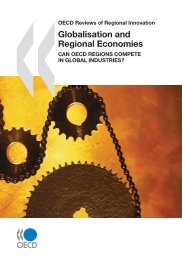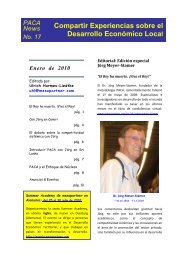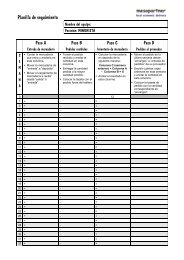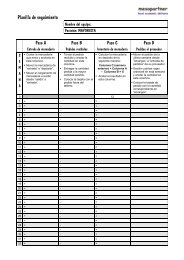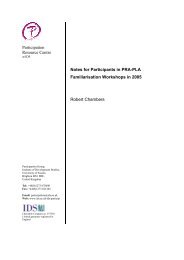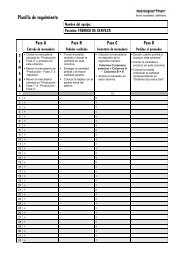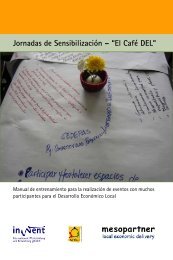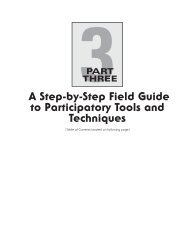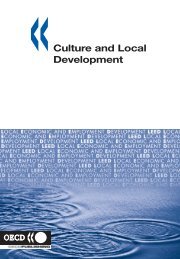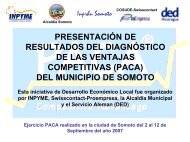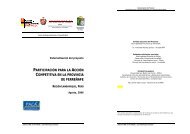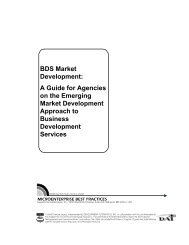McCormick+Schmitz Handbook for value chain research on - PACA
McCormick+Schmitz Handbook for value chain research on - PACA
McCormick+Schmitz Handbook for value chain research on - PACA
Create successful ePaper yourself
Turn your PDF publications into a flip-book with our unique Google optimized e-Paper software.
own its findings and recommendati<strong>on</strong>s. At first glance, it seems that participatory <str<strong>on</strong>g>research</str<strong>on</strong>g><br />
should be more cost effective because it does not require, <str<strong>on</strong>g>for</str<strong>on</strong>g> example, the paid <str<strong>on</strong>g>research</str<strong>on</strong>g><br />
assistants usually required to administer a survey. This ‘advantage’, however, is more<br />
apparent than real, because mobilising local people and facilitating their <str<strong>on</strong>g>research</str<strong>on</strong>g> tends<br />
uses a great deal of relatively expensive <str<strong>on</strong>g>research</str<strong>on</strong>g>er time and energy.<br />
Many of the techniques of participatory <str<strong>on</strong>g>research</str<strong>on</strong>g> have been developed <str<strong>on</strong>g>for</str<strong>on</strong>g> use in<br />
c<strong>on</strong>necti<strong>on</strong> with development work - by governments and/or NGOs - in rural settings.<br />
These are described in now classic work by Robert Chambers and many others who have<br />
built <strong>on</strong> his approach. Some techniques are the same as those used in c<strong>on</strong>venti<strong>on</strong>al<br />
<str<strong>on</strong>g>research</str<strong>on</strong>g>. Participatory <str<strong>on</strong>g>research</str<strong>on</strong>g> uses review of sec<strong>on</strong>dary sources, direct observati<strong>on</strong>,<br />
semi-structured interviews; the difference is that community members rather than<br />
professi<strong>on</strong>al <str<strong>on</strong>g>research</str<strong>on</strong>g>ers carry out much of the work. Participatory <str<strong>on</strong>g>research</str<strong>on</strong>g> is probably<br />
best known <str<strong>on</strong>g>for</str<strong>on</strong>g> the techniques that have been specially developed, such as wealth ranking,<br />
matrix scoring, mapping, and diagramming. In some countries, there are organisati<strong>on</strong>s<br />
devoted to training and promoti<strong>on</strong> of participatory methods (e.g., PAMFORK in Kenya).<br />
These are valuable resources <str<strong>on</strong>g>for</str<strong>on</strong>g> providing communities and <str<strong>on</strong>g>research</str<strong>on</strong>g>ers with in<str<strong>on</strong>g>for</str<strong>on</strong>g>mati<strong>on</strong><br />
about specific methods and techniques that have been tried elsewhere. Some of these<br />
techniques can no doubt be adapted to <str<strong>on</strong>g>value</str<strong>on</strong>g> <str<strong>on</strong>g>chain</str<strong>on</strong>g> <str<strong>on</strong>g>research</str<strong>on</strong>g>, but know that in doing so,<br />
you will be charting new ground! For an overview <strong>on</strong> the <str<strong>on</strong>g>value</str<strong>on</strong>g> of participatory methods<br />
in other fields, see www.ids.ac.uk/ids/particip/<str<strong>on</strong>g>research</str<strong>on</strong>g>/pra.html..<br />
A.8 Feminist <str<strong>on</strong>g>research</str<strong>on</strong>g> methods<br />
Like participatory <str<strong>on</strong>g>research</str<strong>on</strong>g>, feminist <str<strong>on</strong>g>research</str<strong>on</strong>g> rests <strong>on</strong> a philosophical orientati<strong>on</strong> that is<br />
somewhat different from that of c<strong>on</strong>venti<strong>on</strong>al <str<strong>on</strong>g>research</str<strong>on</strong>g>. In the case of feminist <str<strong>on</strong>g>research</str<strong>on</strong>g>,<br />
the starting point is the recogniti<strong>on</strong> that a pers<strong>on</strong>’s material life (what <strong>on</strong>e does <str<strong>on</strong>g>for</str<strong>on</strong>g> a living<br />
and related facts such as the quality of <strong>on</strong>e’s material surroundings) has a profound effect<br />
<strong>on</strong> his/her understanding of the world. A street child who picks through garbage every day<br />
sees life very differently from a middle class schoolboy; a sweeper in a factory has a<br />
different world view from the company’s managing director; a woman’s perspective <strong>on</strong><br />
life in the family is almost always different from her husband’s. Feminist <str<strong>on</strong>g>research</str<strong>on</strong>g><br />
methods try to see the reality being studied from the standpoint of the female members of<br />
121



